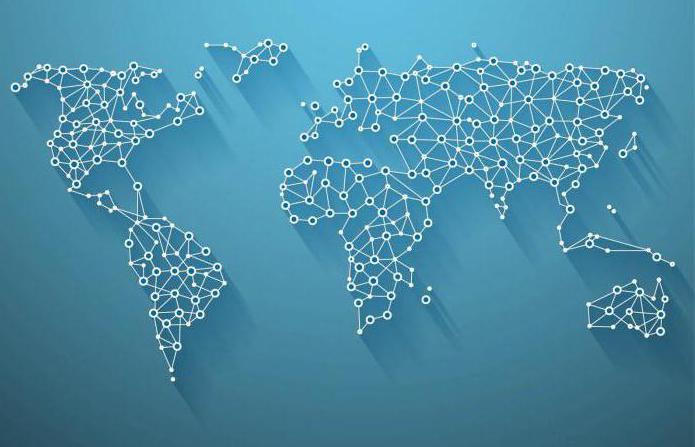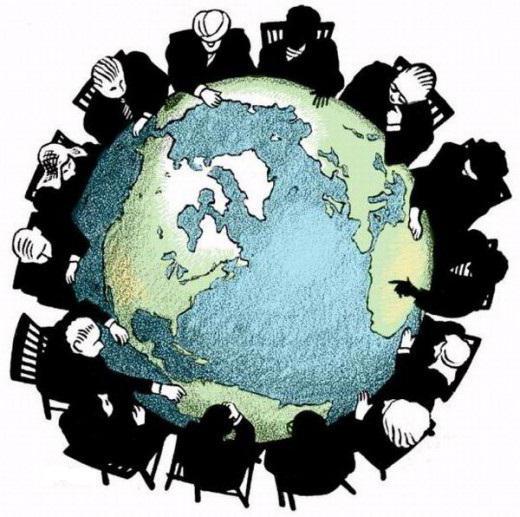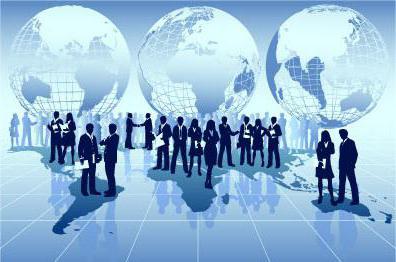In an age of globalization, borders between countries have become much more blurred. And businessmen took advantage of this, well aware that they can scatter their enterprise across many regions, thus saving some of the money that they would spend on paying for some factors of production in one territory.
That is how transnational corporations appeared, the list of which is growing every day. What are they and how are they different from ordinary companies?
The basis of TNCs
It is worth noting that TNCs (this is how the transnational corporation is shrinking) is the last stage of international cooperation between legal entities. Prior to this, the company may be an open partnership or a limited liability company.
Another option is to create cartels - participants jointly regulate production volumes and the process of hiring workers.
The third way of international cooperation is syndicates, which implies coordinated actions in the procurement of raw materials and the sale of goods (one company can produce gasoline and another rubber from the total purchase of oil).

The fourth variant of cooperation is a concern, where only financial management is common, while individuals themselves are constantly engaged in different types of activities (one branch of the company is engaged in tailoring sportswear, and the other in military uniforms).
The closest in their characteristics to the TNC trust - companies merge one of the areas of production, having in it general sales and finances (for example, joint production of aircraft engines and the continuous manufacture of aircraft devices on one side and passenger seats on the other). After the company survives at least a few such cooperations, it can expand to the scale of TNCs.
What is TNCs?
Before moving on to specific data, you should understand what transnational corporations are. The list of their distinguishing features is very long, but the main one is the presence of company capital in several countries of the world.
Despite the fact that enterprises of this magnitude are not located entirely in the territory of a certain country, they are still forced to obey the laws of the state where a particular branch of the corporation operates.
In addition, even state-owned enterprises can be part of transnational corporations, and agreements that result in such cooperation can be either intergovernmental or private, between investors from different countries.
Volatile Ratings
Given the volatility of the market, it is very difficult to talk about some kind of stable rating, which includes multinational corporations. The list of 2016 in many positions differs from the list of leading companies in 2015 and the situation may change, although not globally, in 2017.

Of course, there are certain companies that, due to their fame and status, a large market share, numerous trade and economic ties, can boast of a stable position in the list of the largest, but there are very few of them.
Stability in Change
But nevertheless, despite the instability of the market, certain features that unite the largest transnational corporations in the world can be distinguished. The list of 2016 and earlier years necessarily included:
- American companies: more than a third in the first hundred;
- Japanese enterprises: the number of such international companies in this country is constantly growing, for example, over five years in the nineties in the Land of the Rising Sun 8 new TNCs appeared;
- European companies: The Old World focuses on high-tech industries, actively working with pharmaceuticals and chemistry.
Separately, it is worth noting that the largest number of TNCs is concentrated precisely in the chemical and pharmaceutical industries.
general information
In the global ranking of the most active and influential companies, multinational corporations in the USA are in the lead. The list contains in subsequent positions countries such as China, Japan, India, Germany, Russia, the UK, Brazil, France and Italy. In order to understand the extent of the power of TNCs, it should be said that their total value in 2013 turned out to be four times the global GDP.

The budget of some companies exceeds the budget of entire countries: for example, the volume of sales of the world famous General Motors in the nineties exceeded the GDP of the Scandinavian countries, Saudi Arabia and Indonesia; Japanese Toyota earned money twice as much as the GDP of Morocco, Singapore and Egypt.
Of course, today the situation has changed a bit: some of the regions have significantly increased their economic power, but at the same time, TNCs continue to exceed the GDP of developing countries with their capitals.
TNC rating by market value
But the time has come to assess the real extent of the power that transnational companies have. The list of the largest companies by market value included (according to places):
- Apple (USA).
- Exxon Mobile (oil business, USA).
- Microsoft (USA).
- IMB (USA).
- Wall-Mart Store (the largest retail chain in the world, USA).
- Chevron (energy, USA).
- General Electric (production of locomotives, power plants, gas turbines, aircraft engines, medical equipment, lighting equipment, USA).
- Google (USA).
- Berkshire Hathaway (Investment and Insurance, USA).
- AT&T Inc (telecommunications, AT & Inc).
An interesting fact is that Apple has been a leader for several years in a row, while the following positions are constantly changing. For example, since 2014, General Electric managed to rise from ninth to seventh place, Samsung was, in principle, squeezed out of this rating.
As already mentioned, to date, the leading TNCs in the world are American - this is clearly seen from the rating.
Foreign Assets Rating
But on the other hand, transnational corporations can also be considered. The list of the largest companies in the world in terms of foreign assets (that is, the share of foreign states in the company's capital) is as follows:
- General Electric (energy, USA).
- Vodafone Group Plc (telecommunications, UK).
- Royal Dutch / Shell Group (oil and gas sector, Netherlands / UK).
- British Petroleum Company Plc (oil and gas sector, UK).
- ExxonMobil (oil and gas sector, USA).
- Toyota Motor Corporation (Automotive, Japan).
- Total (oil and gas sector, France).
- Electricite De France (Housing and Public Utilities, France).
- Ford Motor Company (automotive, USA).
- E.ON AG (Housing and Utilities, Germany).
Here the situation is already slightly different from the ranking of the richest companies: the geography is much more extensive, and the areas of interest are different.
Russian multinationals
But are there transnational corporations in Russia? The list of domestic companies of this magnitude is not very large, because in eastern Europe TNCs are just starting to develop, but there are already pioneers here.

It is worth noting that Soviet enterprises, whose branches were scattered throughout the Soviet Union, were something like modern multinationals, so some of them, maintaining the previous level, easily entered the category of multinational companies. Among the most famous such companies today:
- Ingosstrakh (finance).
- Aeroflot (air travel).
- Gazprom (oil and gas industry).
- Lukoil (fuel industry).
- "Alrosa" (mining, diamond mining).
According to experts, Russian oil and gas companies have the greatest potential, which, due to the availability of resources, can easily compete with world leaders in this industry, selling them raw materials and allowing them to extract resources from their own wells. It is worth noting that many global TNCs have their branches in the Russian Federation.
Fuel TNCs
According to the forecasts of Russian experts, the most promising are the fuel multinationals. The list of leaders in this area:
- Exxon Mobil (USA).
- PetroChina (China).
- Petrobras (Brazil).
- Royal Dutch Shell (UK).
- Chevron (USA).
- Gazprom (Russia).
- Total (France).
- BP (UK).
- ConocoPhillips (USA).
- CN00C (Hong Kong).
The presence of a Russian company among the largest TNCs in the world definitely increases the likelihood of other corporations such as Transneft moving to this level, for example, which today is one of the richest companies in the world, which, however, has not yet reached the international level.
The difficulties of TNCs
But is everything so smooth with TNCs? Yes, the expansion of target markets allows them to maximize profits from the sale of their products, but at the same time, is such dispersal not their weakness? What challenges do multinational companies face?
The list of these obstacles is huge, ranging from constant competition with local manufacturers who know their market much better, and ending with political games, because of which the product, which, it would seem, has already been adapted for a certain country, cannot reach store shelves.

TNCs face new markets with a lack of local specialists (potential personnel do not have suitable qualifications), as well as their high salary requirements with productivity equal to other regions.
Nobody has canceled the state’s policy, which may oblige a multinational company to pay huge taxes on profits or prohibit any production in the territory of a particular region: representatives of multinational corporations coming to Russia, for example, note that many branches are delayed by many bureaucracy months.
Thus, even the powers that be, in the form of TNCs, in this case, have certain problems, do not think that their power opens all doors for them.
Development prospects
But what development prospects do transnational corporations of the world have? The list of spheres of their influence, as has been repeatedly mentioned, is really huge. About half of industrial production, almost 70% of trade, almost 85% of inventions and 90% of foreign investments depend on them.
The raw materials trade is owned by TNCs: under their authority, the purchase and sale of wheat (90%), coffee (90%), corn (90%), tobacco (90%), iron ore (90%), copper (85%), bauxite ( 85%) and bananas (80%).
In addition, in America, more than half of export-related operations are controlled by transnational corporations, in the UK the number of such operations is 80%, in Singapore, in principle, built on the money of foreign investors, 90%. 30% of world trade is directly or indirectly related to the activities of TNCs.
And in the future, with the development of globalization, the power of transnational corporations will only increase.

Despite all sorts of difficulties, they are not going to abandon the expansion of new territories, and there are very many markets left where not all possible space belongs to TNC products.
Therefore, the only thing that remains for most of the states that TNCs are aiming at is either to help them by making a certain profit from the arrival of a new entrepreneur in the country, or to defend themselves by introducing a protectionism policy, thereby causing, perhaps, the discontent of citizens who will be forced to purchase transnational products corporations in other markets.
Conclusion
It is impossible to deny the enormous role in the world market of transnational corporations. The list of spheres of their influence, the projects in which they participate, the markets available to them is truly huge.

But nevertheless it is impossible to say unequivocally that the future is not theirs - the competition from the national producer is too strong. Yes, a modern economy without TNCs will not exist in the form in which it exists today, but at the same time it will not succumb to them completely.